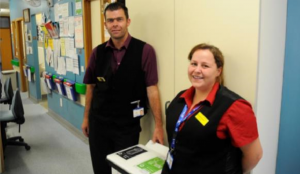- Group home
- You must register/login in order to post into this group.
Reduce Disposables on Abbey, Otter, and Dart Wards – Housekeeping Team

By: Royal Devon and Exeter NHS Foundation Trust
£1274
82kgCO2e (Estimated)
The housekeeping team carried out 2 projects on Otter ward and have since spread changes to Abbey and Dart wards.
Project 1:
Goal: To replace plastic teaspoons with reusable metal spoons.
Background: On the 24-bedded ward around 100 plastic spoons are used each day for three meals for patients & hot drinks for patients and staff. The housekeeping team suggested reducing waste by introducing metal spoons.
Approach: Buy metal teaspoons and stop buying plastic teaspoons.
Results: The cost of water and electricity used to run the dishwasher, the carbon conversion factors for the materials used to make the spoons and the cost of the waste recycling, together with the weight of the two types of teaspoons was used to calculate environmental and cost benefits of this project.
Cost savings: Over 1 year the cost savings would be £245 for a single ward and has the potential to save £7338 if this change was made successfully on 30 wards. These figures include costs of dishwasher use (energy and water) and a waste of 10% of spoons due to damage. If spoons were retained in the ward, then savings would increase year on year.
Environmental savings: 42 kgCO2e were saved by this change.
Social savings: demonstrating good stewardship of resources and including environmental impact into decisionmaking about housekeeping in a healthcare setting.
Next steps: This project has been selected for the concept to be spread to other areas of the hospital.
Project 2:
Goal: to reduce plastics waste from serving orange juice on the ward.
Background: individual portions of orange juice are served in small plastic pots. These are handed out to, on average, 20 patients at lunchtime and at the evening meal.
Approach: instead of buying individual portions of orange juice the ward bought hard plastic tumblers and 1 litre cartons of orange juice. The cost of water and electricity used to run the dishwasher, the carbon conversion factors for the materials used to make the different packaging and the cost of the waste recycling, together with the weight of the two types of packaging was used to calculate environmental and cost benefits of this project.
Otter, Abbey and Dart wards - RD&E
This project was part of the Centre for Sustainable Healthcare's Green Ward competition
The Centre for Sustainable Healthcare runs the Green Ward Competition as a clinical engagement programme for NHS Trusts wishing to improve their environmental sustainability and reduce their carbon footprint.
